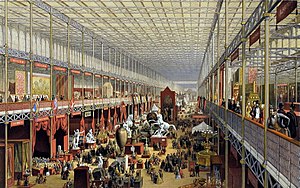The Great Exhibition
The Great Exhibition of the Works of Industry of All Nations, also known as the Great Exhibition or the Crystal Palace Exhibition, was an international exhibition held in Hyde Park, London, England, from 1 May to 15 October 1851 and the first in a series of World's Fair exhibitions of culture and industry that were to be a popular 19th century feature.


The Great Exhibition of the Works of Industry of all Nations (its full title) was organized under the leadership of Prince Albert and members of the Royal Society for the Encouragement of Arts, Manufactures and Commerce.It was planned for 4 months. It was a celebration of modern industrial technology and design.
Its prime motive was for "Great Britain [to make] clear to the world its role as an industrial leader".[1] Prince Albert, Queen Victoria's consort, was an enthusiastic promoter of the exhibition, which was self-financing. Queen Victoria and her family visited three times.
Technology and moving machinery was popular, especially working exhibits. Visitors could watch the entire process of cotton production from spinning to finished cloth. Scientific instruments included electric telegraphs, microscopes, air pumps and barometers, as well as musical, horological and surgical instruments.[2]
The Crystal Palace
changeA special building, The Crystal Palace, [3] was built to house the show. It took the form of a massive glass house, 1851 feet (about 564 metres) long by 454 feet (about 138 metres) wide. It was built with a cast iron-frame and glass. It was made almost entirely in Birmingham and Smethwick.
It was designed by Joseph Paxton with support from structural engineer Charles Fox. The committee which oversaw its construction included Isambard Kingdom Brunel. The building was architecturally adventurous. Paxton's had experience designing greenhouses for William Cavendish, the 6th Duke of Devonshire.
The Crystal Palace was an enormous success. It was an architectural marvel, but also an engineering triumph which showed the importance of the Exhibition itself.[4] The building was later moved and re-erected in an enlarged form at Sydenham in south London, an area that was renamed "Crystal Palace". The building was destroyed by fire on 30 November 1936.[3]
References
change- ↑ Kishlansky, Mark; Patrick Geary and Patricia O'Brien. 2008. Civilization in the West. 7th ed, volume C. New York: Pearson Education.
- ↑ Forgan, Sophie (2000), "A compendium of Victorian culture", Nature, 403 (6880): 596, doi:10.1038/35001134, S2CID 7602408
- ↑ 3.0 3.1 "The Great Exhibition of 1851". Duke Magazine. November 2006. Retrieved 30 July 2007.
- ↑ Ffrench, Yvonne 1950. The Great Exhibition; 1851. London: Harvill Press.
Other websites
change- Prince Albert's speech of 1849, announcing "The Exhibition of 1851" Archived 2008-03-29 at the Wayback Machine
- "Memorials of the Great Exhibition" Cartoon Series from Punch
- Royal Engineers Museum Archived 2010-07-30 at the Wayback Machine Royal Engineers and the Great Exhibition
- "In Our Time" BBC radio programme discussing the Great Exhibition and its impact.
- Images from the catalogue Archived 2007-02-19 at the Wayback Machine on flickr.com
- Charlotte Brontë's account of a visit to the Great Exhibition Archived 2009-01-24 at the Wayback Machine
- Great Exhibition Collection in the National Art Library